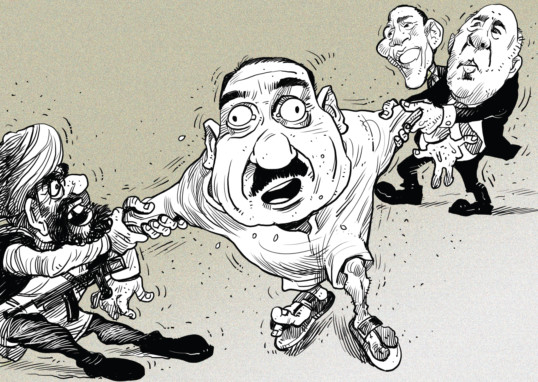
The Islamic State of Iraq and the Levant (Isil) is here to stay for some time. It may be hated and despised, but it looks likely to survive. It is depressing that neither the new Iraqi government nor the emerging military plans of the American’s 10 international allies offer much hope of the essential political solution that will end the Isil threat.
The make up of this week’s new Iraqi government gives little hope that the technocrat Prime Minister Haider Al Adabi will be able to make the dramatic new start that is vital to attract the Sunni militias and parties of Anbar and its neighbouring provinces away from their current alliance with Isil.
There is no way that the few thousands of Isil fighters could either conquer or continue to hold the territories that they have gained in the past few months. They can only do it with the help of the 100,000 odd fighters in the local forces that have been there for many years. The real problem is that these militias are the same people that helped the American forces defeat Al Qaida in 2006 and 2007, and then were betrayed.
When they joined the Anbar Awakening they were promised a more inclusive Iraq and more autonomy in their provinces, which did not happen. Later these Sunni leaders from the provinces of Anbar, Nineveh and Salah Al Deen asked for the same (or less) autonomy that the Kurds had won for themselves, and their hopes were brutally dismissed by Prime Minister Nouri Al Maliki. These actions amongst many others made clear to the Sunnis that they were going to be permanently excluded and persecuted, so they withdrew their allegiance from the state and became ready to join Isil.
The immediate political challenge is to reverse this tragedy. Speaking at the Capital Club in Dubai this week, Ali Khedery, former special assistant to five US ambassadors in Baghdad from 2003 to 2009, made clear that he did not think the Sunni militias would trust either the Iraqi government or the US again without much more substantial offerings than were made previously.
He estimated that about 90 per cent of the present Isil forces are “reconcilable” as they are either Sunni militias or formations of former Baathists, who should be interested in taking part in normal Iraqi politics if they saw some self advantage. If the new government and its new international allies come up with a strong political offer, this might attract the “reconcilables” away from the “unreconcilables” who are the hard core Isil fighters including large numbers of international fighters who have no interest in Iraq.
But this essential offer is unlikely to emerge and Khedery was very pessimistic that the mix of personalities in the emerging Iraqi cabinet would be able to combine with any sense of vision to rebuild a more inclusive Iraq.
Lack of vision
This view was supported by Jaafar Altaie, Managing Director of Manaar Consulting, who lamented the lack of any vision and foresaw Iraq splitting permanently into three sections, with considerable violence and bloodshed for the foreseeable future. When pressed for any glimmer of optimism, he did add that in the end the three parts of Iraq might eventually want to work with each other on a more equitable basis than is currently possible.
Altaie also said that the split would have disastrous consequences across the region as Isil is set to run one third of Iraq (as well as any part of Syria that it can claim), and is it now ready to implement its global mission into a series of targets in the Middle East’s fragile states such as Lebanon and Yemen, vulnerable targets like the remaining military and nationalist republics and the hard targets of the Gulf states which remain relatively stable, as well as the two local super powers of Israel and Turkey. Altaie said that Isil did not need to stick to this list in any order, and if the opportunity arose for it to attack an obvious target such as Israel, it would gain considerable regional prestige.
Therefore when US President Barack Obama used NBC’s Meet the Press to trail last night’s speech on his Isil policy, he said “There’s going to be an economic, political and military elements to it. Over the course of months, we are going to be able to not just blunt the momentum of Isil. We are going to systematically degrade their capabilities. We’re going to shrink the territory that they control. And ultimately we’re going to defeat ‘em.”
Well and good. But this mission is only part military. It is also very much political as well, which means local Iraqi political, not Washington political. And this is where the US has made such terrible mistakes over the past 12 years as it degraded Iraq. Let’s hope Al Abadi’s cabinet are on side and are willing to work with the Americans. And let’s hope that the militia leaders who need to change sides are given the space to do so in a way that builds a new political future for Iraq. Because if they don’t, the future is grim.











